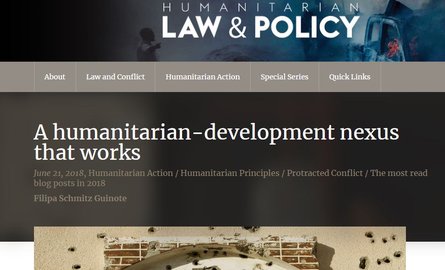
The decades-old discussion on the ‘humanitarian-development nexus’ is again in full swing. At the beginning, it focused on aid effectiveness, handover and sustainability. Today, it is about joint action towards shared goals—using the UN Sustainable Development Goals (SDGs), conflict prevention and sustaining peace agendas as key reference points.
The weight and influence of development policy and development actors over the ‘nexus’ discussion is very strong. But a nexus that works needs to have a solid humanitarian component. First because without neutral, independent and impartial humanitarian action many people and places will be left out of reach, behind military frontlines and political fault lines—blind spots. Second, because the respect for international humanitarian law (IHL) in the conduct of hostilities is a missing piece of nexus discussions. The way wars are fought can impact the extent to which development dividends may come from the achievements of humanitarian action. The choices the parties make in the conduct of hostilities can minimize or exacerbate destruction. This, in turn, affects infrastructure, services, systems and the lives of people now and in the future.